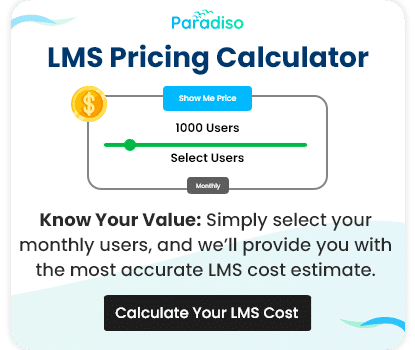-
1. Ensure Consistency in Restaurant Operations
Restaurants can ensure consistent operations by using a Learning Management System (LMS). Before LMS, training varied from restaurant to restaurant. Now, with an LMS, restaurants have a centralized system that delivers content and tasks consistently. This consistency makes employees more effective and efficient. It provides standardized content, instant updates, and tracks progress, ensuring all employees receive the same training and stay updated, leading to better outcomes for the restaurant.
-
2. Cost Savings with a Restaurant LMS
It reduces costs. It eliminates traditional training expenses like hiring trainers, printing materials, and renting space. LMS offers streamlined, efficient training that gets new employees up to speed faster. It leads to lower turnover rates and improved resource utilization. Plus, LMS ensures compliance, reducing the risk of fines. All these factors combine to generate significant cost savings for restaurant operations.
-
3. Enhance Staff Knowledge with Restaurant LMS
In restaurants, the staff’s knowledge is super necessary. They can give better service, make customers happier, and help the business succeed when they know a lot. Learning Management Systems (LMS) are like special restaurant training software that keeps the staff’s knowledge fresh. Imagine a busy kitchen where the chef has a cookbook that always updates with new recipes and tips. That’s what LMS does for restaurant staff. It helps them stay ready for any changes in the menu or customer preferences.
-
4. Balance Training Expenses in Restaurants
Managing your budget is easier with a Restaurant Learning Management System (LMS). It helps track and control training costs, keeping your restaurant on budget. Traditional training can be costly and wasteful, but an LMS offers a cost-effective, budget-friendly solution. It provides digital training materials, eliminating the need for printed copies and associated costs. Additionally, it boosts the employee experience by offering flexible, on-demand access to training materials, making learning more convenient for everyone.
-
5. Raise Employee Productivity through Remote Training
In the restaurant industry, employee training is essential, but traditional methods can become ineffective over time. Implementing a learning management restaurant for remote training is a solution that saves time and money for both management and staff. LMS ensures a flawless learning experience, allowing access to training materials from anywhere, anytime. It also eliminates the need for physical restaurant materials and rigid training schedules, providing flexibility for all.
-
6. Simplify Management with Restaurant Training Software
For any organization, having an organized employee training system is crucial. That’s where an LMS comes in. It centralizes training materials while connecting different departments in the organization.
Using CMS software:
- Employees access customized course content and save their progress.
- This creates an orderly learning environment, ensuring smooth operations for employees and the organization.
- LMS simplifies training, saving time and effort by consolidating resources.
-
7. Facilitate Access to Resources in Restaurant Training
In restaurants, everyone needs to know what’s in stock, from ingredients in the pantry to tools in the kitchen. This knowledge keeps things running smoothly:
Knowing What’s On Hand: Understanding the restaurant’s inventory ensures smoother operations.
Shared Knowledge: Involving all staff in inventory management motivates them and positively impacts their work, contributing to the restaurant’s success.
Effective Resource Management: With everyone’s participation, resources are managed more efficiently, leading to better business outcomes.
-
8. Maximize Onboarding Efficiency with Restaurant LMS
In the Restaurant industry, staff turnover is expected and can make it challenging to get new employees up to speed. However, a Learning Management System (LMS) can make this process much more straightforward:
Smoother Start: A Restaurant LMS integrated with employee management software simplifies onboarding, providing new employees with essential information about their roles and the workplace.
Efficient Induction: It automates and improves the induction process, ensuring consistent and thorough training for all new team members.

















